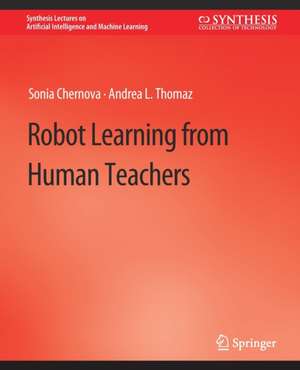Robot Learning from Human Teachers: Synthesis Lectures on Artificial Intelligence and Machine Learning
Autor Sonia Chernova, Andrea L. Thomazen Limba Engleză Paperback – 30 apr 2014
Din seria Synthesis Lectures on Artificial Intelligence and Machine Learning
- 20%
 Preț: 415.95 lei
Preț: 415.95 lei - 20%
 Preț: 382.86 lei
Preț: 382.86 lei - 20%
 Preț: 222.03 lei
Preț: 222.03 lei - 20%
 Preț: 226.46 lei
Preț: 226.46 lei - 20%
 Preț: 223.51 lei
Preț: 223.51 lei - 20%
 Preț: 194.88 lei
Preț: 194.88 lei - 20%
 Preț: 223.67 lei
Preț: 223.67 lei - 20%
 Preț: 226.14 lei
Preț: 226.14 lei - 20%
 Preț: 333.95 lei
Preț: 333.95 lei - 20%
 Preț: 356.08 lei
Preț: 356.08 lei - 20%
 Preț: 388.17 lei
Preț: 388.17 lei - 20%
 Preț: 384.03 lei
Preț: 384.03 lei - 20%
 Preț: 415.95 lei
Preț: 415.95 lei - 20%
 Preț: 230.94 lei
Preț: 230.94 lei - 20%
 Preț: 227.29 lei
Preț: 227.29 lei - 20%
 Preț: 229.77 lei
Preț: 229.77 lei - 20%
 Preț: 356.08 lei
Preț: 356.08 lei - 20%
 Preț: 345.82 lei
Preț: 345.82 lei - 20%
 Preț: 357.71 lei
Preț: 357.71 lei - 20%
 Preț: 225.48 lei
Preț: 225.48 lei - 20%
 Preț: 224.50 lei
Preț: 224.50 lei - 20%
 Preț: 224.97 lei
Preț: 224.97 lei - 20%
 Preț: 228.13 lei
Preț: 228.13 lei - 20%
 Preț: 226.97 lei
Preț: 226.97 lei - 20%
 Preț: 337.20 lei
Preț: 337.20 lei - 20%
 Preț: 389.63 lei
Preț: 389.63 lei - 20%
 Preț: 327.12 lei
Preț: 327.12 lei - 20%
 Preț: 328.09 lei
Preț: 328.09 lei - 20%
 Preț: 224.00 lei
Preț: 224.00 lei - 20%
 Preț: 195.06 lei
Preț: 195.06 lei - 20%
 Preț: 227.29 lei
Preț: 227.29 lei - 20%
 Preț: 353.93 lei
Preț: 353.93 lei - 20%
 Preț: 325.86 lei
Preț: 325.86 lei - 20%
 Preț: 385.18 lei
Preț: 385.18 lei - 20%
 Preț: 224.65 lei
Preț: 224.65 lei - 20%
 Preț: 383.48 lei
Preț: 383.48 lei - 20%
 Preț: 177.47 lei
Preț: 177.47 lei - 20%
 Preț: 224.97 lei
Preț: 224.97 lei - 20%
 Preț: 270.51 lei
Preț: 270.51 lei - 20%
 Preț: 358.70 lei
Preț: 358.70 lei - 20%
 Preț: 289.28 lei
Preț: 289.28 lei - 20%
 Preț: 226.64 lei
Preț: 226.64 lei - 20%
 Preț: 177.29 lei
Preț: 177.29 lei - 20%
 Preț: 178.96 lei
Preț: 178.96 lei - 20%
 Preț: 226.46 lei
Preț: 226.46 lei - 20%
 Preț: 177.81 lei
Preț: 177.81 lei - 20%
 Preț: 334.71 lei
Preț: 334.71 lei
Preț: 224.50 lei
Preț vechi: 280.62 lei
-20% Nou
Puncte Express: 337
Preț estimativ în valută:
42.96€ • 44.97$ • 35.54£
42.96€ • 44.97$ • 35.54£
Carte tipărită la comandă
Livrare economică 05-19 aprilie
Preluare comenzi: 021 569.72.76
Specificații
ISBN-13: 9783031004421
ISBN-10: 3031004426
Ilustrații: XI, 109 p.
Dimensiuni: 191 x 235 mm
Greutate: 0.23 kg
Editura: Springer International Publishing
Colecția Springer
Seria Synthesis Lectures on Artificial Intelligence and Machine Learning
Locul publicării:Cham, Switzerland
ISBN-10: 3031004426
Ilustrații: XI, 109 p.
Dimensiuni: 191 x 235 mm
Greutate: 0.23 kg
Editura: Springer International Publishing
Colecția Springer
Seria Synthesis Lectures on Artificial Intelligence and Machine Learning
Locul publicării:Cham, Switzerland
Cuprins
Introduction.- Human Social Learning.- Modes of Interaction with a Teacher.- Learning Low-Level Motion Trajectories.- Learning High-Level Tasks.- Refining a Learned Task.- Designing and Evaluating an LfD Study.- Future Challenges and Opportunities.- Bibliography.- Authors' Biographies.
Notă biografică
Sonia Chernova is an Assistant Professor of Computer Science and Robotics Engineering at Worcester Polytechnic Institute and the director of the Robot Autonomy and Interactive Learning (RAIL) lab. She earned B.S. and Ph.D. degrees in Computer Science from Carnegie Mellon University in 2003 and 2009, and was a Postdoctoral Associate at the MIT Media Lab prior to joining WPI. Dr. Chernovas research is focused on interactive machine learning, adjustable autonomy, crowdsourcing, and human-robot interaction. She has received funding support from NSF, ONR, and DARPA, including an NSF CAREER award on Learning from Demonstration in 2012.Andrea L. Thomaz is an Associate Professor of Interactive Computing at the Georgia Institute of Technology. She directs the Socially Intelligent Machines lab, which is affiliated with the Robotics and Intelligent Machines (RIM) Center and with the Graphics Visualization and Usability (GVU) Center. She earned a B.S. in Electrical and Computer Engineering from the University of Texas at Austin in 1999, and Sc.M. and Ph.D. degrees from MIT in 2002 and 2006. Dr. Thomaz has published in the areas of Artificial Intelligence, Robotics, and Human-Robot Interaction. She has received recognition as a young leader in her field, receiving an ONR Young Investigator Award in 2008, and an NSF CAREER award in 2010. Her work has been featured on the front page of the New York Times, on NOVA Science Now, she was named one of MIT Technology Reviews Top 35 under 35 in 2009, and on Popular Science Magazines Brilliant 10 list in 2012.
